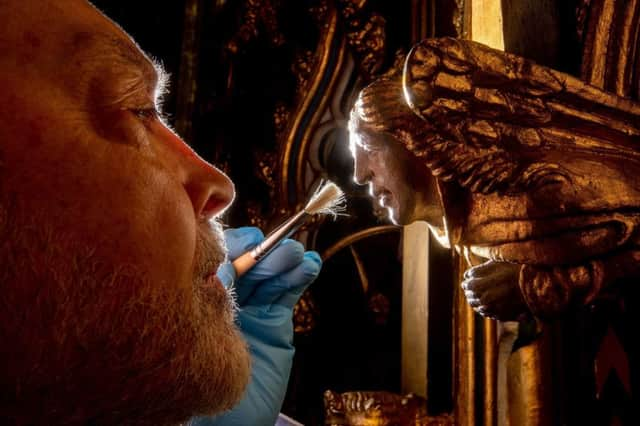Spring in York as grass appears beneath Minster apostles


At the feet of the apostles at the Crucifixion was laid a distinctive green carpet, dotted with daisies.
It was the result not of the improving weather but of an operation described by the director of works at the cathedral as the biggest spring clean for a generation.
Advertisement
Hide AdAdvertisement
Hide AdThe object of the exercise was one of two religious carvings – reredoses, in ecclesiastical parlance – that had lain out of reach and, for the last decade out of sight, too.
“I have only ever seen it under layers of dust accumulated over decades,” said Alex McCallion, whose job is to care for the fabric of the Minster.
“I hadn’t realised that everybody is standing on grass and there are daisies are painted on top.
“When I saw it this morning it was all green again.”
The reappearance of the two ornaments had come at the end of a 10-year project to restore the East End of the Minster.
Advertisement
Hide AdAdvertisement
Hide AdFine art conservators have spent the last five weeks removing dust and dirt from the carvings, using museum vacuums and specialist cleaning gels to unveil the detailed paintwork.
The decorations sit below the Great East Window, the largest expanse of medieval stained glass in the country. They reappeared last May when an £11.5m project to restore the 600-year-old panes was completed and the main scaffolding removed. But the decorations have had to wait until now for their own resurrection.
A team led by Francis Downing, fine art conservator for the Chapter of York, and Lee Godfrey, the Minster’s own expert, undertook the work.
The terracotta Crucifixion, 7ft off the ground behind the altar in St Stephen’s Chapel, dates from the 1880s. In the Lady Chapel, its companion piece, depicting the nativity, was created in 1905 as a memorial to Queen Victoria. It replaced an earlier framework which was last restored in 1844.
Advertisement
Hide AdAdvertisement
Hide Ad“The lustre of the gold is quite magnificent in the natural light of the Lady Chapel,” Mr McCallion said.
“The setting is magnificent, beneath the window which now looks as it would have done in 1408.”
The level of “dust and muck” that had accumulated during the restoration of the window – during which time the reredoses had been left in situ within protective boxes – had been light compared to the accumulated residue of the previous decades, he said.
“Within the Minster, you’ve got candles burning for services, people passing through every day and the doors open to the pollution of the city, so there’s a lot of dirt circulating in the air. And the reredoses are quite out of reach during normal cleaning.”
The last of the scaffolding is expected to be gone by the end of the month.